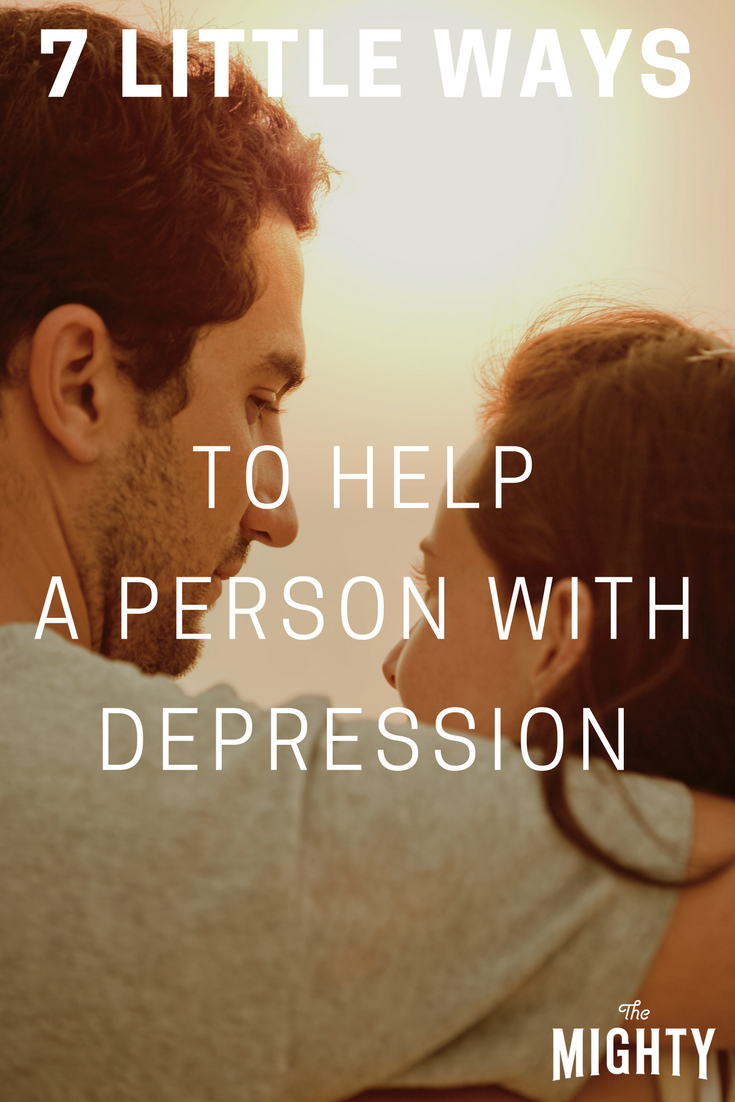These seven little ways to help a person with depression come directly from my life. This is not an extensive list. It is just some things that stand out to me — things that mean a lot to me now that I am in a good place mentally and can look back on the dark times. Maybe some of these ideas can help you help someone you know who is struggling and cannot do it on their own.
Seven little ways to help a person with depression:
1. Validate feelings.
After graduating from college in Chicago, I went as a missionary to Africa. I lived and worked in a village for a year. I did not have electricity or running water. Many of the people in the village did not understand English and I did not know their tribal language, making it hard to communicate. There were many things during that year that were very good, but also things that were difficult for me.
I returned home to the US, and everyone wanted to hear stories about my African adventure. They wanted to hear stories of how God had worked. I felt I had to be upbeat and tell stories of how wonderful it was for me to be a missionary. Inside though, I started to become depressed. That year in Africa had put me in positions that were more than I could handle. I felt I had failed. I felt no one could understand why being a missionary would make me go into depression.
It wasn’t until my pastor said to me at church one day, “Wow, that must have been hard. You shouldn’t have been sent out there alone,” rather than, “Wow, what you did was amazing,” that I finally felt a little understood. I finally felt that someone saw me.
Sometimes, just saying, “Wow, that must be hard,” to a depressed person can bring a little relief for a moment.
2. Help them get help.
I did not have the strength or know how to get help for my depression. It took a friend saying, “Can I make an appointment with a counselor for you?” for the first steps to get help to be taken.
Then it took my counselor saying, “Can I make an appointment with a doctor for you?” for me to know I may need medical help.
When it came time to go to the doctor’s appointment, it took a secretary at the church going with me to even get me to go there. My anxiety and depression were so bad. I got a prescription for antidepressants, but even that I could not get on my own. The secretary took me to the pharmacy, then took me to her house and let me rest on her bed while we waited for it to be ready.
The steps it takes to get help may seem easy to a person who is not depressed, but for a depressed person it can be more than they can handle on their own. Sometimes a friend, a counselor, or even a church secretary needs to say, “Can I do this for you to get you help?”
3. Follow up.
One of my friends knew I had gone to the doctor. He also knew I was prescribed antidepressants. I don’t know what made him think I might not take them once I got home, but his hunch was right. I was scared to take them, and probably would not have, except that he came over and encouraged me to do so. When my friend did this, it was almost like he was saying, “Can I give the courage and desire to you?” I could not find it on my own at that point.
Maybe you have seen someone you know who is depressed be given help. That is not the time to just relax and walk away. A friend is still needed to give encouragement to take that next step in the healing process.
4. Just be together.
I remember when my sister lived with me for a while. In my depression, I would lie on the couch in a dark house watching TV or just staring sadly ahead. I know it made her sad and she wanted to help, but she did not know how. I remember one day when she got home from work, and I was covered in a blanket lying on the couch. I don’t remember if she even said anything, but I do remember that she came over, lay down on the blanket on top of me, and just hugged me. I don’t know how long that hug lasted, but it made me feel loved. My sister doesn’t even remember she did this, but it is one of the encouraging moments which I remember still.
You don’t need to always say something to someone who is in a state of depression. Sometimes making a point to just be in the same room silently with them can be as good or better than giving advice. A hug or a soft touch can often communicate a feeling of being cared for that words cannot describe.
5. Be encouraging without expectations.
There was a time when something very hurtful had happened to me, which was magnified by the fact of my depression. I found myself crying deeply, shut in my room. One of my roommates must have heard me crying. Without saying anything to me, she slipped a 3×5 card with a verse she had written on it under my bedroom door. The verse from the Bible came from the Psalms. It was a verse about the love of God. She didn’t expect me to thank her or explain my hurts to her. She did an encouraging act and then let it speak for itself. I stuck that 3×5 card on my wall by my bedroom door and often looked at it as I left the room.
An encouraging quote or caring note, an invitation to do something together, or a word of love or appreciation can go a long way when a person is depressed. The person may not have the energy or ability always to respond back to you, but be encouraged — your encouragement has meaning.
6. Offer to go the extra mile.
One day I was having a very hard time. All I could think about was wanting to hurt myself or to kill myself. I knew I needed to go to the hospital. I went there and was sitting outside of the emergency room. I decided to call my dad first. I had not been very open with my parents in the past about my struggles, but now I wanted their support and love. That is what I got. My parents were very concerned. My dad even offered to get in the car right then and drive the three hours from where they lived to come stay with me. Though I did not take him up on his offer, I treasured the fact he loved me.
There was another time I had a breakdown and could not handle going to work. A family I trusted offered for me to come stay with them so that I would be safe from myself. This I did, then my mom made that three-hour drive to come stay with me and to just be with me while I recovered.
Are you willing to do the big things that need to be done in times of crisis for your friend or loved one? Will you go the extra mile? It may be inconvenient and take away from other things, but it may even save a life. I know it kept me safe at those dark times.
7. Help others understand.
Depression and other mental illnesses are not always understood in our society, and there is often stigma against them. When these things show up in someone’s life, the people around often do not understand what is happening. The person whom it is happening to is often in no state to explain. Fear can build up in friends and family. Sometimes it would be helpful for the people who do have the insight to explain it to those who do not.
I remember a time I was in the psychiatric ward in the hospital. I had not been open with my roommates about my mental state. My parents explained what I was going through to my roommates for me, and explained the depression and mental illness I was dealing with. This took some of the pressure off me to try to figure out what to say to them. After that, I knew my roommates cared for me, that they still accepted me, and knew it was OK to talk about it.
Do you understand much about depression and other mental illnesses? If so, great. If not, would you be willing to learn about it? All of us need to have good mental health. People with depression and others with mental illnesses are just that: people. Let us all be open to start talking, and listening, and learning. We can learn how to help. We can learn how to love. We can break the stigma against depression and mental illnesses.
And, to all of you who I have mentioned in my examples, thank you so much for caring enough to do something to help me. Whether it was big or small, I love you all.
Follow this journey on the author’s blog.
If you or someone you know needs help, visit our suicide prevention resources page.
If you struggle with self-harm and you need support right now, call the crisis hotline at 1-800-273-8255 or text “START” to 741-741. For a list of ways to cope with self-harm urges, click here.
We want to hear your story. Become a Mighty contributor here.
Thinkstock photo via AntonioGuillem


